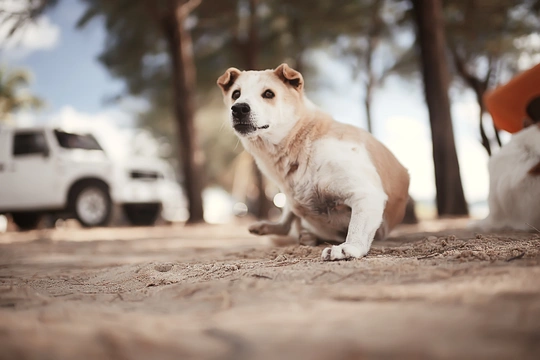
Dog arthritis: what it is, what are the symptoms, and how to treat it
By Greg Steele MRCVS
Dogs are naturally very energetic and are living longer. This means that their joints are coming under more wear and tear, which leads to the condition of osteoarthritis. This is very common in all dogs but especially larger and more active ones as they age.
What is arthritis (osteoarthritis) in dogs?
Arthritis is the inflammation of a joint. The most common cause is wear and tear over the years, but it can happen after trauma, infection, abnormal growth, or surgery. It can affect just one joint but usually appears in multiple ones (especially larger joints like hips, knees, and elbows), and can also affect the spine. It is incurable and slowly progressive, although can flare up faster if joints are not well cared for.
What are the signs of arthritis in dogs?
Arthritis causes constant discomfort and stiffness. Individual dogs manage this in different ways based on different pain thresholds. If you are in doubt, it is important to consult your Vet at an early stage for a proper examination. Joints are only visible on X-rays, so this is often used to confirm the diagnosis.
- Stiff, slow to rise, struggling on walks.
- Lethargic, depressed, becoming grumpier or even aggressive.
- Often but not always a clear limp.
- Struggling to go upstairs or uphill.
- Struggling to sit or go to the toilet normally.
- Licking painful joints.
- If a particular leg hurts, your dog will shift their weight to stop using it. This makes the muscles waste away and so one leg will look thinner compared to the other. In dogs with hip pain, the hip muscles shrink so your dog’s back end looks skinny compared to the front.
- There may be loss of fur over pressure points or if feet are being dragged.
Dog arthritis treatment
There are many treatment options for dogs with arthritis, and the more you can use, the better the outcome is likely to be. It is good to approach this problem from many angles, alongside professional help from your Vet.
Natural remedies and home remedies for dogs with arthritis
- Weight control is vital. Dogs with arthritis are less active so likely to gain weight, and this puts even more pressure on painful joints. Control calories to keep your dog as slim as possible.
- Exercise control is important to make sure your dog does not overdo it. Dogs are very much mind over matter and will cheerfully throw their painful joints around if they are playing with you on a walk. The trouble is they don’t know they will regret this the next day! Be kind and take it easy. Short, regular, controlled exercise is best, ideally on steady and smooth surfaces that are not taxing the limbs.
- Adapt your home to ensure your dog is not at risk of slips and falls. It is sensible to start avoiding stairs and put rugs and carpets on slippery floors. You can buy or manufacture ramps and these can be very helpful (especially in and out of the car). Deep and comfortable dog beds are good to reduce pressure on joints while your dog rests.
- Consider physiotherapy and hydrotherapy – more professionals are now available, and these can make a huge difference to overall joint and muscle health.
- Dietary supplements for arthritis in dogs can be helpful. The best-studied ones are the Omega-3s (fish oils) which are good for joints and overall health. Use products designed for dogs as an overdose is possible.
Medicines and veterinary for dogs with arthritis
- There is a wide range of painkillers used for dogs with arthritis, most of which are prescription-only. Discuss their pros & cons with your Vet as each dog needs an individual approach. These drugs can be extremely effective in keeping dogs more comfortable for as long as possible, but they do not slow the disease.
- Occasionally, surgery may be recommended for specific painful joints.
- Some professionals offer laser treatment.
- In some cases, dogs may benefit from joint injections of anti-inflammatories or steroids. This is not done as commonly as in humans, as it is painful and as we can’t explain this beforehand to a dog, an anaesthetic is required.
Arthritis in dogs affects the quality of life
As arthritis progresses, it may start to affect your dog’s quality of life and cause them to suffer, even with the best management. As dogs struggle, arthritis is sadly a reason to choose to put dogs to sleep once treatment stops working well. The timing of this decision will come down to an honest conversation between owner and Vet, but it is important to realise this is the last kind of treatment option to ensure your dog does not suffer unnecessarily.



